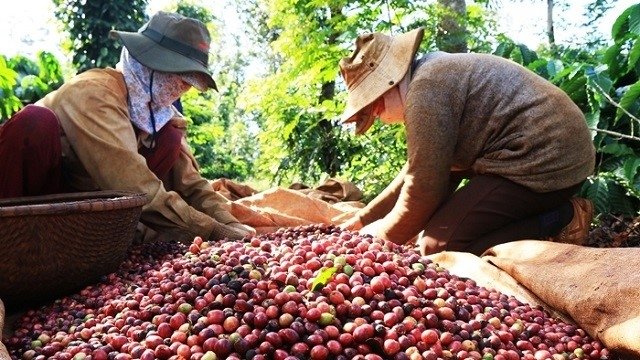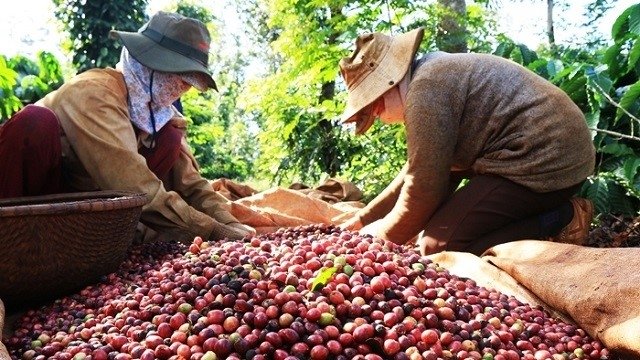
As the world's leading producer of coffee, it is important to promote branding, value-added increases and global value chain participation for Vietnamese coffee, experts have suggested.

Multiple solutions are needed to improve the quality of Vietnamese
coffee.
According to the General Department of Customs, for the first
nine months of 2018, Vietnam’s
coffee exports reached over 1.4 million tonnes, valued at US$2.75 billion, up
18.8% in volume.
Germany and the US continued to be the two largest
consumer markets for Vietnamese coffee in the first eight months of 2018, with
market shares of 12.6% and 9.8%, respectively. Other markets with a sharp
increase in the imports of Vietnamese coffee in the first eight months this
year included Indonesia (+ 8
times), Russia (+ 66.6%) and
Philippines
(+ 46.6%).
However, global demand and coffee prices
have a direct impact on domestic coffee prices. The average coffee export price
in the Jan-Aug period was down 15.5% over the same period in 2017, reaching
US$1,913 per tonne.
In September, unroasted robusta coffee in
Vietnam’s Central
Highlands decreased by VND700 a kg to VND31,900 - 32,500 per kg,
compared with the previous month. During the first nine months of 2018,
domestic coffee prices fluctuated sharply with the fall ranging from VND 2,100
- 2,400 a
kg.
The fluctuations in the world market
causing impacts on the domestic market are inevitable. However, experts have
shown how to reduce these impacts to the maximum. Tran Van Hung, from Fair
Trade Project in Vietnam,
suggested that besides ensuring the quality of coffee, it is important to
promote the participation of Vietnamese coffee in international certification
on fair trade or sustainability, in order to have a stable coffee price in the
world market and ensure an income for farmers.
"When these certificates are
available, each price movement on the world market ensures that farmers are
still able to sell their coffee at a minimum price. This price guarantees that
farmers growing coffee will have profit to reinvest," Hung said.
Dao Duc Huan, Director at the Centre for
Rural Development (under the Institute
of Policy and Strategy
for Agriculture and Rural Development), said that in the face of market demand,
it is necessary to promote advantages and determine the appropriate strategy
and long-term approach for Vietnamese coffee to affirm its role and position.
In particular, building a high-quality Vietnamese coffee brand is an important
solution and is the basis for promoting effective and sustainable value chains
for Vietnamese coffee products in the future.
To realise this goal, in addition to support
from the State in accessing market demand information, it is essential to
develop synchronous policies and solutions to promote and introduce coffee
products aimed at raising the image of Vietnamese coffee in the world market,
contributing to raising its value and promoting market expansion in the context
of deeper international economic integration.
Source: NDO
According to data from the Hoa Binh Provincial Party Committee, the industrial production index for the first six months of 2025 is estimated to have increased by 20% compared to the same period last year. This marks the highest year-on-year growth rate for this period since 2020.
In the first six months of 2025, Hoa Binh province’s export turnover was estimated at 1.145 billion USD, marking an 18.11% increase compared to the same period in 2024. Import turnover was estimated at $ 804 million, a 17.15% increase, which helped the province maintain a positive trade balance.
The lives of the ethnic minority farmers in Tan Lac district have gradually improved thanks to the new directions in agricultural production. This is a testament to the collective strength fostered through the professional associations and groups implemented by various levels of the district’s Farmers’ Union.
With the motto the "product quality comes first,” after nearly one year of establishment and operation, Muong village’s Clean Food Agricultural and Commercial Cooperative, located in Cau Hamlet, Hung Son Commune (Kim Boi district), has launched reputable, high-quality agricultural products to the market that are well-received by consumers. The products such as Muong village’s pork sausage, salt-cured chicken, and salt-cured pork hocks have gradually carved out a place in the market and they are on the path to obtaining the OCOP certification.
In the past, the phrase "bumper harvest, rock-bottom prices" was a familiar refrain for Vietnamese farmers engaged in fragmented, small-scale agriculture. But today, a new spirit is emerging across rural areas of Hoa Binh province - one of collaboration, organisation, and collective economic models that provide a stable foundation for production.
Maintaining growing area codes and packing facility codes in accordance with regulations is a mandatory requirement for agricultural products to be eligible for export. Recently, the Department of Agriculture and Environment of Hoa Binh province has intensified technical supervision of designated farming areas and packing facilities to safeguard the "green passport" that enables its products to access international markets.



